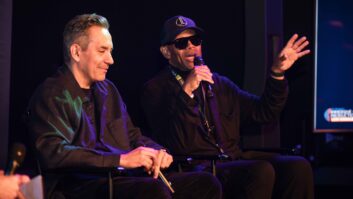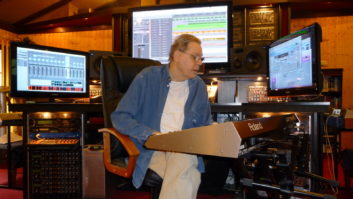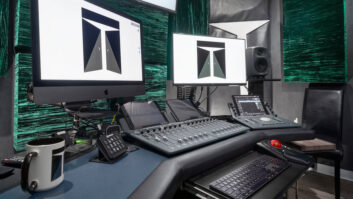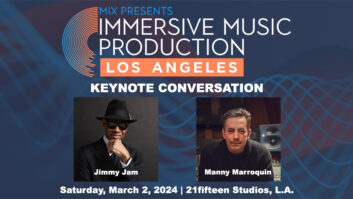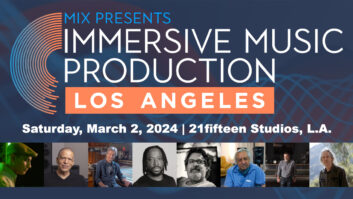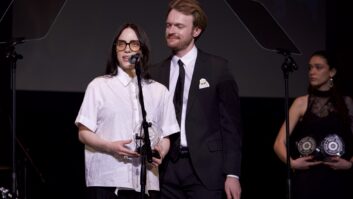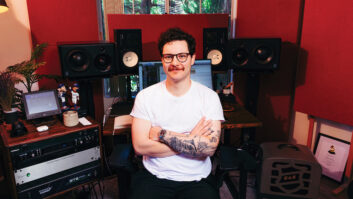Mark Loughman’s Bleedin’ Aura, released on Spitfire Music this year, hinges on his English indie-rock roots, demanding an active listening experience as each of its nine songs shimmer with gritty authenticity. On the record, Loughman—who co-produced the album himself with Warren Huart [Aerosmith, The Fray]—is joined by many of his talented friends, including Kenny Aronoff (drums), Steve Stevens (guitar) and Billy Morrison (guitar). Pro Sound News caught up with the ex-Mancurian—now the L.A.-based owner of BAE Audio—as he was working on demos for his next release.
On ‘running away’:
I have some Manchester in my life, but it’s kind of a place I ran away from. In the 70s of course, there was The Hollies, 10cc, and all that. And then in the 90s, when the whole ‘Madchester’ scene kicked off, we were part of it, but we were on the fringe because it was a dance-oriented, druggie thing—at that time, we were still into indie rock. My band stuck to our 70s rock roots and we didn’t really fit into the scene. I think the last gig I did in England was with Sting and it felt like we were on the cusp of making it. But sadly, nothing came of it, so a year later I came to the States.
On busking Stateside:
I came to New York with a guitar, a bag and some demo tapes. I handed them out and knocked on some doors. But quite rapidly, I hit a brick wall again. So I decided to see a bit of America and hopped on a Greyhound. I had a rough plan to go to musically themed places like Memphis, Nashville, and New Orleans. Every time I stepped off the Greyhound, all I needed to do was earn enough money to pay for the hotel by busking on the street, and that’s how I lived. When I finally made it to L.A., it just felt like home so I just stayed here, playing gigs in bars and restaurants.
On mixing music and entrepreneurship:
I realized that I was getting on a bit in age, so I had to decide what I was going to do. So I got a job as an intern at a preamp manufacturer, and temporarily put my music making on the back burner. But then, after I ended up buying the company [now BAE Audio], I didn’t do music for the best part of 10 years because I was concentrating on building a business. Around that time is when the irony hit: I had access to the best recording gear in the world, but I wasn’t recording. So some of the friends I met along the way—like Kenny Aronoff, Steve Stevens and Slash—said, “Why don’t you make an album?” So I did, and Bleedin’ Aura is the result.
On appreciating signal flow:
When I recorded in England way back when, I was just interested in the creative side, and was not interested in signal flow or anything of that nature. But once I realized how a signal makes it from inception to an amplifier to a recording mechanism, it gave me a whole new appreciation of how a record is made and how it sounds. Unfortunately, the way its all going now with MP3s, I don’t feel things are very encouraging. We come from a time in the 60s and 70s, where you would sit down in a space in your home and put on a 12” record. You would read the liner notes and it was a complete experience. I grew up that way.
On tracking drums at Sunset Sound:
I played most of the instruments myself, except for the drums, and the lead guitar on a few songs; Kenny Aronoff [John Mellencamp, John Fogerty] played drums. The drums were recorded Sunset Sound in Hollywood, where a number of Rolling Stones, Prince, Steely Dan and many other records were made. To follow up, we did some overdubs at Warren’s Spitfire Studios in Laurel Canyon, and then some more in my own studio. We recorded it sporadically over time, and I added the lyrics to my songs at the end. By that time, I had the palette of the melodies, and this helped dictate the lyrics to at least half of them. Frankly, everything came together quite easily.
On working with Steve Stevens:
One cool thing that happened over the course of the record was that I asked Steve Stevens (Billy Idol, Michael Jackson, Vince Neil) to give me his input on one of the tracks. And within 48 hours, he sent me a final edit of a guitar solo—it happened that fast. His enthusiasm and amazing guitar work gave me validation—I realized people like this can play on almost any album they like, and he said, “Mark, I love it.” That was the last song, ‘One Way Flight.’ After he sent his solo along, he said, “Let me know if you ever want me to play on anything else.” That experience was really gratifying.
On perservering:
One of the reasons I left England was because some people told me that when you hit age 30, your career is over. And even if you never had a career, it would never begin. That was a really cynical opinion. So I came here and now I have all these talented friends who tell me it was a good thing I didn’t listen to any of the cynics. It feels great to be sticking my feet in this new pond. For years, it felt like making music was just banging my head against the wall, but now I know I can do it. As long as I’ve got an outlet for it, even if is in minimal supply, I’ll continue doing it—even if it is just for me.
